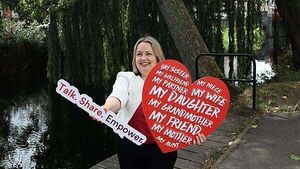Stress and cost preventing women from protecting heart health – research

By Jonathan McCambridge, PA
Lack of motivation, stress and a concern that health checks are too expensive are preventing Irish women from protecting their heart health, data has suggested.
The high cost of healthy foods and gym memberships are also creating barriers to living a healthy lifestyle, according to the research for the Irish Heart Foundation.
The Ipsos B&A research for the charity’s Her Heart Matters campaign reveals only 13 per cent of females correctly think they are more likely to be diagnosed with heart disease and stroke than breast cancer (66 per cent), despite the former conditions killing six times as many women as breast cancer.
Only 51 per cent of women surveyed know the symptoms of heart disease and stroke.
Janis Morrissey, the Irish Heart Foundation’s director of health promotion, said: “What we are asking women to do is to take stock of where they are at and understand what factors impact their heart health – even one small change can make a huge difference.
“It seems for many, life and lack of time is getting in the way, but it’s not about a drastic overhaul of lifestyle, just to ask themselves questions such as – am I stressed? Am I active? How is my diet? Do I smoke? When did I last have my blood pressure checked?”
The charity is concerned about the reasons women do not prioritise their heart health, with worries about the cost of health checks identified as a key factor (25 per cent).
Nearly one-in-four (23 per cent) said they did not feel motivated to look after their heart health, 21% per cent said gym memberships are too expensive, and 18 per cent identified the high cost of healthy foods.

When combined, stress/anxiety and lack of time were factors for 26 per cent of women.
“Time, or lack of it, has consistently come up as a barrier, as have stress and cost of living concerns,” said Ms Morrissey.
“This appears to be fuelling a general lack of motivation. It could be a case that women feel they are juggling too much.
“Also, there remains a sizeable gap between the perceived dangers of breast cancer versus heart disease, which unfortunately is still seen as a male disease, despite all the evidence.”
The campaign, supported by the Department of Health Women’s Health Fund and the HSE, encourages women to take control of their heart health and reduce their risk of cardiovascular disease.

Minister for Health, Jennifer Carroll MacNeill, said that women continue to experience poorer cardiovascular health outcomes than men and said she is committed to changing that by helping to improve awareness of heart disease and stroke symptoms.
“It’s a reminder to all of us to reignite the conversation around heart health, and to encourage women to make small lifestyle changes that can make a really big difference,” she said.
Sarah O’Brien, national lead for the healthy eating and active living programme, health & wellbeing at the HSE, said: “We’re delighted to support Her Heart Matters campaign.
“The very practical tips and information provided are an easy way for women to start thinking about their heart health.”
For the research, 1,018 nationally representative interviews amongst those aged 16 and above were conducted via Ipsos B&A’s Acumen online panel from July 29th to August 5th.




